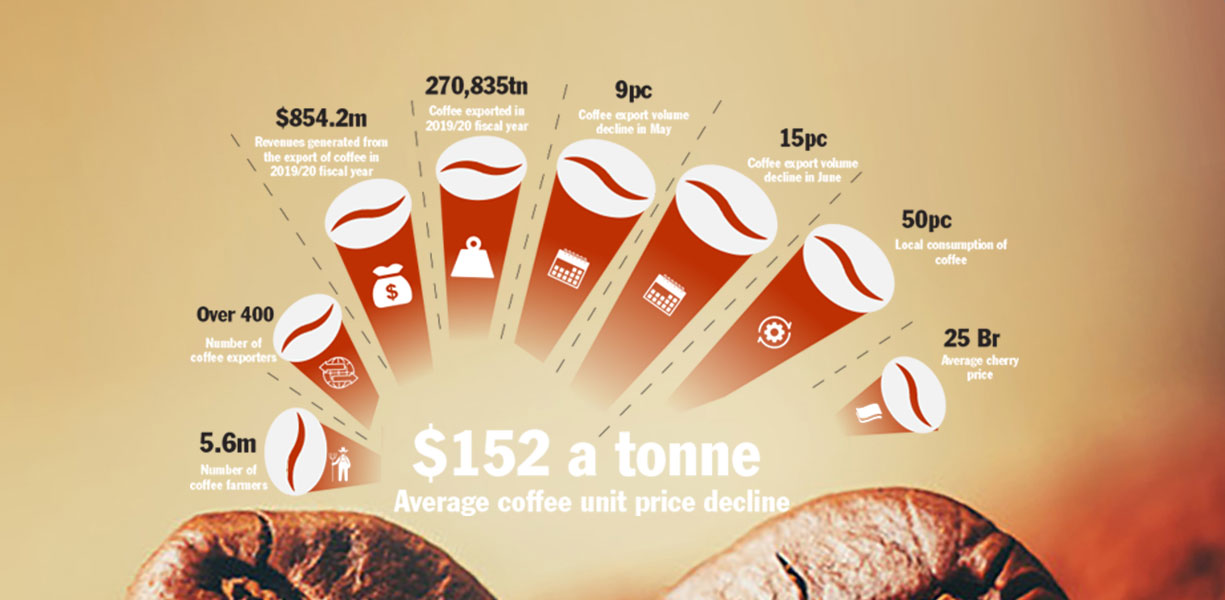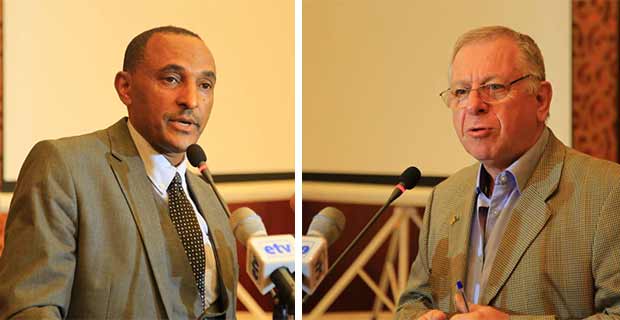
Fortune News | Jul 18,2020
Sep 8 , 2019
By YOSEPH MERGU ( FORTUNE STAFF WRITER )
 Adugna Debela (PhD), director-general of Ethiopian Coffee, Tea Development & Marketing Authority and Dominique Davoux (PhD), a delegation of the European Union to Addis Abeba.
Adugna Debela (PhD), director-general of Ethiopian Coffee, Tea Development & Marketing Authority and Dominique Davoux (PhD), a delegation of the European Union to Addis Abeba. The European Union granted 10.5 million euros for a project that aims at increasing the quality and quantity of coffee production in 28 weredasin the country.
The EU-Coffee Action for Ethiopia (EU-CAfE) project will be implemented in 16 selected coffee-growing weredasof Oromia Regional State, 10 weredasfrom Southern Nations, Nationalities & Peoples' Regional State and two weredasfrom Amhara Regional State.
Though the country is endowed with ample coffee resources, no projects were supporting the coffee sector for the past three decades, according to Adugna Debela (PhD), director-general of Ethiopian Coffee, Tea Development & Marketing Authority.
"The project plans to increase the income of smallholder coffee farmers and actors in the coffee value chain, in turn increasing the benefit the country gets from the export of coffee," Adugna said.
It also focuses on speciality and traceable coffee products, value chain development and trade transparency through public-private partnerships. The support is also expected to elevate smallholder farmer’s access, including women and youth, to high-quality input technologies.
While having a high demand globally, Ethiopian coffee is not getting the right price in the international market, according to Dominique Davoux (PhD), a delegation of the European Union to Addis Abeba.
“The project will conserve the environment to retain the uniqueness of Ethiopian shade-grown coffee," he said. "It will also work toward improving market access by focusing on certified and geographically differentiated speciality coffee production and marketing.”
Smallholder farmers should have to be supported if the country needs to create consistent growth in volume and quality of exportable coffee, according to Wasihun Mohammed (PhD), a lecturer at Haromaya University's School of Plant Science.
"Kenya’s coffee exporters support the farmer, because they know well that it is the farmer who plays a significant role in product quality and market integration,” said Wasihun.
According to the expert, farmers need professional and technical support related to growing, harvesting, drying and all other processes that are involved in coffee production. There needs to be adequate delivery of coffee extension services within weredas, he suggested.
Coffee is the major exportable commodity of the country. It covers one-third of the revenue generated by commodity exports. In the past fiscal year, Ethiopia earned 763 million dollars from the export of 230,764tn of coffee. The income is 70pc of its target. The coffee is produced mainly in Harar, Sidamo, Yirgacheffe and Limu.
To promote Ethiopia's coffee, the Ethiopian Coffee, Tea Development & Marketing Authority is developing a national umbrella coffee brand, which is expected to be launched soon.
PUBLISHED ON
Sep 08,2019 [ VOL
20 , NO
1011]

Fortune News | Jul 18,2020

Fortune News | Feb 19,2022

Radar | Feb 13,2021

Sponsored Contents | Mar 28,2022

Radar | Sep 19,2020

Advertorials | Apr 08,2024

Fortune News | Sep 27,2020

Radar | Mar 02,2024

Radar | Jun 22,2024

Radar | Jan 07,2022

Dec 22 , 2024 . By TIZITA SHEWAFERAW
Charged with transforming colossal state-owned enterprises into modern and competitiv...

Aug 18 , 2024 . By AKSAH ITALO
Although predictable Yonas Zerihun's job in the ride-hailing service is not immune to...

Jul 28 , 2024 . By TIZITA SHEWAFERAW
Unhabitual, perhaps too many, Samuel Gebreyohannes, 38, used to occasionally enjoy a couple of beers at breakfast. However, he recently swit...

Jul 13 , 2024 . By AKSAH ITALO
Investors who rely on tractors, trucks, and field vehicles for commuting, transporting commodities, and f...

Jul 12 , 2025
Political leaders and their policy advisors often promise great leaps forward, yet th...

Jul 5 , 2025
Six years ago, Ethiopia was the darling of international liberal commentators. A year...

Jun 28 , 2025
Meseret Damtie, the assertive auditor general, has never been shy about naming names...

Jun 21 , 2025
A well-worn adage says, “Budget is not destiny, but it is direction.” Examining t...